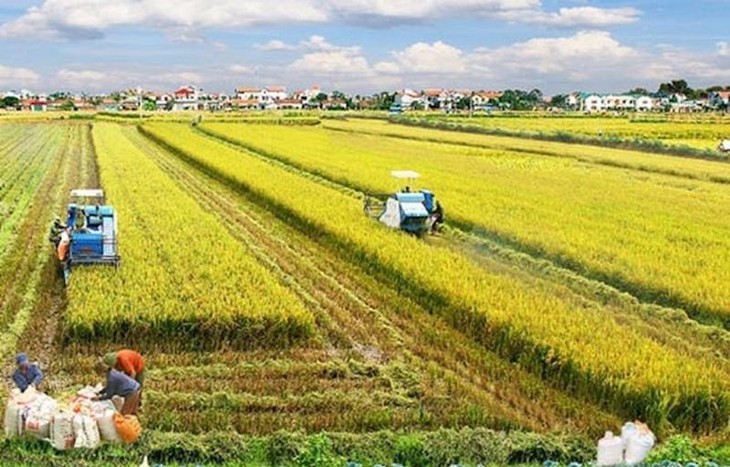(VOVWORLD) - On Monday, Vietnam attended the 37th Asia-Pacific Regional Conference of the United Nations Food and Agriculture Organization (FAO) in Sri Lanka. Taking place over 3 days, the conference discusses challenges and priorities related to sustainable food and agriculture and regional cohesion. At the event Vietnam continued to affirm its responsibility for sustainable agricultural development and green growth.
 (Photo: congthuong.vn) (Photo: congthuong.vn) |
Sustainable agricultural and rural development is Vietnam’s basic orientation to ensure food security, promote international integration, create export momentum, and enhance its own position and reputation.
Toward green growth of eco-agriculture
Vietnam is moving towards green growth and ecological agriculture development. Reducing carbon emissions is not just a slogan, but has become a target and norm included in development projects. Producers, traders, processors, and consumers have changed their mindset toward green growth, says Minister of Agriculture and Rural Development Le Minh Hoan.
"Green agriculture is an irreversible trend that we must adapt to. In fact we have adapted to it. For example, in Hai Duong province, farmers follow the model of rice-clam worm-fiddler production. They earn more income from selling clam worms than from selling rice, but without rice, there wouldn’t be the two other products.
Bac Lieu and Ca Mau province follow the rice-shrimp and rice-fish models. Vietnamese farmers have been shifting towards an ecological agriculture. Such models should be spread to develop circular agriculture, green agriculture, ecological agriculture, and nature-based agriculture,' said Hoan.
To promote green growth Vietnam has initiated a project to produce one million hectares of high-quality, low-emission rice in the Mekong River Delta by 2030. The project demonstrates Vietnam's responsibility to the international community in combating climate change and building a low-emission agriculture.
Last March, Vietnam issued a National Action Plan on Food Systems Transformation toward Transparency, Responsibility, and Sustainability by 2030 with the aim of becoming a transparent, sustainable, responsible food producer and supplier, which Vietnam committed to at the UN Summit on food systems in 2021.
In-depth development
Digital transformation is considered a breakthrough solution, creating a new driving force for growth and development of the agricultural economy. The application of digital technology in management, production, business, traceability, and product supply chains brings transparency and accuracy to food origins, and creates new opportunities for sustainable agricultural development.
This year Vietnam will reorganize its agricultural production toward intensive production associated with geographical indications, traceability, and coded growing areas. It aims to base production plans on market trends, meet domestic and export demand, increase trade promotion, get technical and trade barriers removed, and expand export markets.
Deputy Minister of Agriculture and Rural Development Phung Duc Tien said: "We will implement strategies, programs, and projects on agricultural development, especially the National Strategy on Sustainable Agriculture and Rural Development in the 2021-2030 period, the Plan on Agricultural Restructuring in the 2021-2025 period, and the National Target Program on New Rural Development in the 2021-2025 period. We will transition from agricultural production to an agriculture economy and from single-sector development to multi-sector cooperation and development, promote multi-value integration in agricultural, forestry and fishery production, and shift from agricultural supply chains to commodity chains."
Stability and in-depth development of the agricultural sector will help drive Vietnam's economic growth this year. Sustainable development of Vietnamese agriculture will contribute to ensuring global food security.